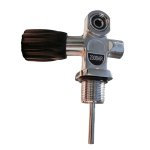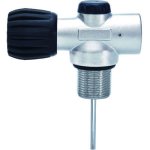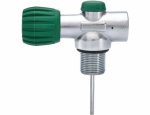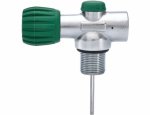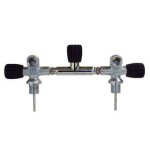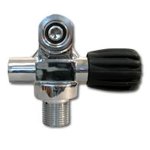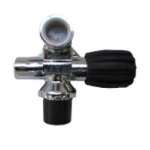Shop by Category
Info
Cylinders Tanks show info...
Using the correct scuba diving cylinder is just as important to a diver's success and safety as how they configure their gear. A diver may go to an enormous effort to insure every hose, reel and accessory is exactly right only to 'drop the ball' by making the wrong cylinder choice.
The Scuba Doctor dive shop brings you scuba cylinders from the leading cylinder manufacturers in the world — Faber and Catalina — so you can not only get it done, but can get it done right.
No cylinder is perfect for every diver, or every diving situation. The Scuba Doctor offers the most complete selection of cylinders in the industry, allowing you to choose what is best for your unique needs.
All cylinders from The Scuba Doctor are suitable for nitrox service (i.e. up to 40% oxygen), visually inspected and shipped with a current hydrostatic date (except where indicated).
Australian Standards
In Australia, scuba Tanks must be tested every year (12 months). We always ship cylinders with a current hydro test date. Due to manufacturing and import cycles, the popular sizes of cylinders typically have a factory hydro date less than 12 months old. However less popular sizes of cylinders may have a factory hydro date up to 24 months old as these are manufactured and imported less frequently.
As per the Australian Standards, the cylinders and valves we sell are for Imperial 0.750-14 NPSM (3/4 NPS) neck threads, NOT Metric M25 neck threads, and the valves have overpressure relief devices (burst discs). (Cylinders with Metric M25 neck threads do not comply with Australian Standards.)
The Faber steel cylinders have ISO 9809-1 markings. The Catalina aluminium cylinders have DOT-3AL2957 markings. All of these cyliners comply with Australian Standrads and are suitable for use in Australia. They may, or may not, meet the standards applicable in other coutries.
Choosing Your Scuba Cylinder/Tank
Scuba diving cylinders (USA: tanks, UK: bottles) are awkward and heavy, and if you fall down with one on you'll be lying on your back flailing your arms and legs in the air like a turtle flipped on it's shell.
Without scuba cylinders you can never be like that same turtle 'flying' gracefully through the water, experiencing a world that almost defies explanation.
Like all scuba gear, choosing a scuba diving cylinder/tank/bottle takes more thought and planning than just walking into a dive shop and grabbing the first thing you see.
There are a few different kinds of cylinders, each with their own pros and cons. Plus, not all diving cylinders can be used for all types of diving. The video below may help you to chose which dive cylinder is best for your needs.
Types of Scuba Diving Cylinders
Steel Scuba Cylinders
Steel scuba cylinders have been around since the start of scuba diving, while aluminium diving cylinders came into use in the 1970s. Steel scuba cylinders are typically more expensive than the same capacity aluminium cylinders.
A steel diving cylinder is a lot tougher than an aluminium one, making it less likely to pit or dent. If properly cared for it will last longer than an aluminium cylinder. However, steel rusts with exposure to moisture and thus needs more careful care.
Because steel is stronger it can be handle higher pressures with a thinner wall thickness, making a steel cylinder smaller and lighter than an aluminium one of similar capacity.
Also If you want to use higher pressures (e.g. 300 bar), you will need to use a DIN valve which may make it hard to get refills depending on where you're diving.
Most technical divers use steel scuba cylinders, but they can be a good cylinder for regular recreational scuba diving too. The most common size is a 232 bar, standard 12.2 litre steel cylinder, but many women and those who use less air often prefer a lighter and smaller 10.5 litre cylinder.
Steel cylinders are more negatively buoyant than equivalent aluminium cylinders and only become less negatively buoyant as they are emptied. Thus they are popular in cold/temperate water areas where thick wetsuits and drysuits are used, because a steel cylinder means you can carry less weight on your weight belt.
Aluminium Scuba Cylinders
Aluminium scuba cylinders came into use in the 1970s and are the most common scuba cylinders you'll find in tropical waters for recreational diving. Many dive shop, boat and resort operations use them worldwide.
The most common size used for diving is the aluminium 80 cubic foot (11.1 litre), but they can be smaller or larger depending on what they're meant to be used for.
For example, a bail out or pony bottle is much smaller than a standard size aluminium 80.
Aluminium cylinders being made of a softer, lighter material have thicker walls, making them larger and heavier than steel cylinders of the same capacity. Aluminium cylinders are relatively inexpensive and thus a good choice for most recreational scuba divers.
One downside of the aluminium scuba diving cylinders is that most go from being negatively buoyant to positively buoyant as they empty during the dive, so most divers wear a few extra kilograms (or pounds) of weight to compensate for this. There are a few models of aluminium cylinders that are built specifically to eliminate this problem, but like everything else, the more features it has, the more expensive it is.
Typically aluminium cylinders are certified for use at a working pressure of 200 to 210 bar. But some newer ones are available rated to nearly 230 bar. Again, these cylinders are more expensive and heavier.
Things To Consider When Buying Scuba Diving Cylinders
Here are a few other things to consider before buying.
- Length/height of the cylinder. Is it so long it bumps your butt and the back of your head at the same time?
- Weight of the cylinder. Is it too heavy for you to handle comfortably?
- Type of diving. Do you technical dive or not?
- If it's steel, is it a low pressure (LP) steel cylinder (e.g. 232 bar), or a high pressure (HP) one (e.g. 300 bar)?
- Does it have a DIN valve, or more common A-clamp/Yoke valve, or a valve that can be converted from DIN to Yoke using an insert?
- If it's a used cylinder, when was it last visually inspected or hydro tested?
Our Recommendations
When purchasing scuba cylinders, the long-term advantages of steel's excellent buoyancy characteristics and long life make it the best choice for most divers, but especially those in cold and temperate waters. Choose a 232 bar steel tank size that meets your needs when it is under filled, putting an end to short fill concerns. For most divers this will be a 12.2 litre (100 cubic foot) cylinder, but some may prefer the smaller 10.5 litre (85 cubic foot) cylinder.
If your budget is tight, then aluminium cylinders initially costs significantly less. If going with an aluminium cylinder, avoid paints, and choose the brushed finish.
For both steel and aluminium cylinders you should choose a convertible valve having a DIN outlet with K (yoke) insert, often described as a 'DIN/K' valve. (That's why we provide this as our standard offering.).
Remember, the standard 207 bar aluminium 11.1 litre (80 cubic foot) capacity cylinder with a K valve is not a "one-size-fits-all" tank. Making the right cylinder choice can significantly improve your diving enjoyment. Please use this list as a guide when reviewing scuba diving cylinders and you should be able to find the right cylinder/tank to last you for years of diving.
For more help buying the best diving cylinder (Tank / Bottle) for you, please see our Buying a Scuba Cylinder guide.
The Scuba Doctor dive shop is your best source for scuba diving cylinders.
Search Our Product Range

Dolphin Tech Twin Cylinder Tank Bands - 203mm (8")

Dolphin Tech Twin Cylinder Tank Bands - 184mm (7.25")

San-o-Sub DIN/K Cylinder Valve - 232 bar - Green - Oxygen Clean

San-o-Sub DIN/K Cylinder Valve - 232 bar - Black - Oxygen Clean

San-o-Sub DIN HP Cylinder Valve - 300 bar - Oxygen Clean

San-o-Sub DIN HP Cylinder Valve - 300 bar - Not Oxygen Clean

Ocean Design DIN/K Cylinder Valve - 230 bar - Not Oxygen Clean

San-o-Sub DIN/K Sidemount Cylinder Valve - LEFT (232 bar) BK

San-o-Sub DIN/K Sidemount Cylinder Valve - RIGHT (232 bar) GR

San-o-Sub DIN/K Sidemount Cylinder Valve - LEFT (232 bar) GR

San-o-Sub DIN/K Sidemount Cylinder Valve - LEFT (232 bar) - Gree

San-o-Sub DIN/K Sidemount Cylinder Valve - RIGHT (232 bar) BK O2

San-o-Sub DIN/K Sidemount Cylinder Valve - LEFT (232 bar) BK O2

San-o-Sub DIN/K Sidemount Cylinder Valve - RIGHT (232 bar) - Gre

San-o-Sub DIN/K Sidemount Cylinder Valve - RIGHT (232 bar) BK

San-O-Sub Rebreather X Flow Inline Cylinder Valve (300 bar) - BK

San-O-Sub Rebreather X Flow Inline Cylinder Valve (232 bar) - Gr

San-O-Sub Rebreather X Flow Inline Cylinder Valve (300 bar) - Gr

San-O-Sub Rebreather X Flow Inline Cylinder Valve (232 bar) - BK

Sonar Premium Rebreather In-Line Valve - BLACK (300 bar)
Max: 5

Sonar Premium Rebreather In-Line Valve - BLACK (230 bar) Green
Max: 1

Sonar Premium Rebreather In-Line Valve - GREEN (230 bar)
Max: 1

Sonar Premium Rebreather In-Line Valve - GREEN (300 bar)
Max: 1

San-o-Sub Dual Outlet Isolation Manifold (300 Bar) - 192 mm (7.6

San-o-Sub Dual Outlet Isolation Manifold (232 Bar) - 212 mm (8.4

San-o-Sub Dual Outlet Isolation Manifold (232 Bar) - 212 mm (8.4

Sonar Dual Outlet Isolation Captured O-Ring Manifold (300 bar) -
Max: 1

San-o-Sub Dual Outlet Isolation Manifold (232 Bar) - 150 mm (5.9

San-o-Sub Dual Outlet Isolation Manifold (300 Bar) - 150 mm (5.9

San-o-Sub Dual Outlet Isolation Manifold (232 Bar) - 192 mm (7.6

San-o-Sub Dual Outlet Isolation Manifold (300 Bar) - 212 mm (8.4

San-o-Sub Dual Outlet Isolation Manifold (300 Bar) - 212 mm (8.4

Sonar Dual Outlet Isolation Captured O-Ring Manifold (300 bar) -
Max: 1

San-o-Sub Dual Outlet Isolation Manifold (300 Bar) - 150 mm (5.9

San-o-Sub Dual Outlet Isolation Manifold (232 Bar) - 192 mm (7.6

San-o-Sub Dual Outlet Isolation Manifold (300 Bar) - 192 mm (7.6

San-o-Sub Dual Outlet Isolation Manifold (232 Bar) - 150 mm (5.9

San-o-Sub Modular DIN/K Manifold Valve - LEFT (232 bar)

San-o-Sub Modular HP DIN Manifold Valve - LEFT (300 bar) - Oxyge

San-o-Sub Modular DIN/K Manifold Valve - RIGHT (232 bar) O2

San-o-Sub Modular DIN/K Manifold Valve - LEFT (232 bar) O2

San-o-Sub Modular DIN/K Manifold Valve - RIGHT (232 bar) BLANK

San-o-Sub Modular DIN/K Manifold Valve - LEFT (232 bar) BLANK

San-o-Sub Modular DIN/K Manifold Valve - RIGHT (232 bar) O2 BLAN

San-o-Sub Modular HP DIN Manifold Valve - LEFT (300 bar) - Not O

San-o-Sub Modular DIN/K Manifold Valve - LEFT (232 bar) O2 BLANK

San-o-Sub Modular HP DIN Manifold Valve - RIGHT (300 bar) - Oxyg












